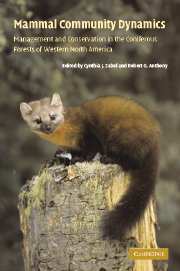 Mammal Community Dynamics
Mammal Community Dynamics Published online by Cambridge University Press: 15 December 2009
The small and mid-sized carnivores (Carnivora), or mesocarnivores of western forests comprise 16 species (coyote (Canis latrans), red fox (Vulpes vulpes), gray fox (Urocyon cinereoargenteus), ringtail (Bassariscus astutus), raccoon (Procyon lotor), marten (Martes americana), fisher (M. pennanti), ermine (Mustela erminea), long-tailed weasel (M. frenata), mink (M. vison), wolverine (Gulo gulo), northern river otter (Lontra canadensis), western spotted skunk (Spilogale gracilis), striped skunk (Mephitis mephitis), Canadian lynx (Lynx canadensis), and bobcat (Lynx rufus)). The term “forest carnivores” denotes a smaller group of four species – the marten, fisher, lynx, and wolverine – and is only marginally descriptive, inasmuch as it excludes many carnivores that live in forests, and includes the wolverine, which can thrive in the complete absence of trees. The species we consider here represent four (or five (Dragoo and Honeycutt 1997)) taxonomic families and are characterized by adult body weights typically <20 kg. Other mesocarnivores, including the kit fox (Vulpes macrotis), swift fox (V. velox), least weasel (Mustela nivalis), black-footed ferret (M. nigripes), and badger (Taxidea taxus), occur in the West, occupy habitats near forest edges, and may be conservation concerns. However, they are plains or grassland specialists or, in the case of the least weasel, very poorly known, and cannot be characterized in terms of their needs for forest attributes. So, they are not treated here.
Our understanding of the ecology of carnivores in western coniferous forests varies markedly.
To save this book to your Kindle, first ensure [email protected] is added to your Approved Personal Document E-mail List under your Personal Document Settings on the Manage Your Content and Devices page of your Amazon account. Then enter the ‘name’ part of your Kindle email address below. Find out more about saving to your Kindle.
Note you can select to save to either the @free.kindle.com or @kindle.com variations. ‘@free.kindle.com’ emails are free but can only be saved to your device when it is connected to wi-fi. ‘@kindle.com’ emails can be delivered even when you are not connected to wi-fi, but note that service fees apply.
Find out more about the Kindle Personal Document Service.
To save content items to your account, please confirm that you agree to abide by our usage policies. If this is the first time you use this feature, you will be asked to authorise Cambridge Core to connect with your account. Find out more about saving content to Dropbox.
To save content items to your account, please confirm that you agree to abide by our usage policies. If this is the first time you use this feature, you will be asked to authorise Cambridge Core to connect with your account. Find out more about saving content to Google Drive.